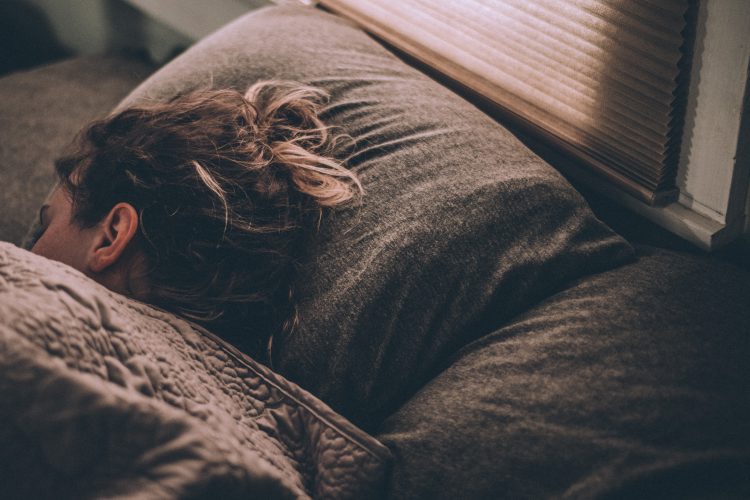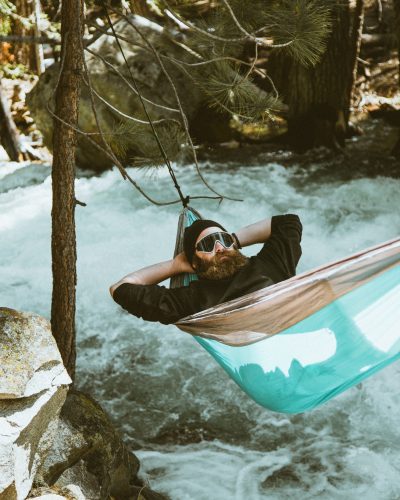5 Tips for Sleeping Well During Travel

You know those people who can fall asleep anywhere at any given time in any (im)possible position? Yeah, I hate them too.
I was never one of those people. I have trouble falling asleep even when I’m dead tired, cuddled in a nice, comfy bed with the temperature and lighting set just right and the heavenly angels quietly whispering lullabies into my ear.
This makes traveling just a tad more difficult, especially when I’m on the road for a long period of time and it’s essential for me to be well-rested and conscious.
So, I did what I had to do and began experimenting.
From earplugs and eye masks to traveling pillows and melatonin pills – I’ve tried it all.
And now I’m here to share with you the wisdom I’ve gained during those long, restless nights on the road.
Hopefully, these few tips and tricks will help you sleep well during travel so you can make the best of your holiday!
#1 Adjust Your Sleeping Habits
Fighting jet lag and keeping a healthy sleeping schedule while traveling can be quite daunting, so it’s best to start early with the preparations. Contrary to what most people believe, fixing up your sleeping routine starts before you head out for your next trip!
The first thing you want to do is do a quick Google search about your next destination and learn about the time zone you’re heading to. According to some research, people have a harder time adjusting their sleep patterns when traveling eastwards, as it’s more difficult for the body to advance the sleeping rhythm than it is to delay it.
Once you have the time zone figured out, you’ll want to start adjusting your sleeping routine accordingly. Go to bed a couple of hours earlier/later and make sure to schedule your alarm clock to wake you up at appropriate times. This might be a bit challenging, especially at first, but it’ll be worth your while once you arrive at your destination.
Another thing you want to consider is your diet. Staying hydrated at all times is essential, as it can help your body adjust to this new rhythm more easily. It’s also a good idea to avoid overly caffeinated drinks and alcohol, at least until you get used to this new sleeping pattern. To avoid feeling sluggish, try not to munch on heavy foods and focus on eating healthy meals and nutritional snacks.
A cup of chamomile tea before bed can also help you sleep better.
Related: Tips for sleeping on an airplane
#2 Create a Routine
While some people live for active vacations, others might not thoroughly enjoy the idea of working out while traveling, which is why this next tip might not be suited to everybody’s taste.
You might not like it, but keeping active while traveling can do wonders for your sleep, which is why it’s a good idea to find a way to implement at least a bit of exercise into your vacation.
The good news is that working out doesn’t necessarily mean that you need to hit the gym while on vacation, you just need to make the best use of your surroundings. Swimming, hiking and cycling are all great choices for keeping active, but you can also try yoga or some light stretches for a low-impact version.
Aside from some light exercise, practicing certain breathing techniques together with meditation can put you straight in that sleeping mode.
#3 Check Your Surroundings
Before we venture into the sleeping props part, let’s spend some time talking about your sleeping environment.
Creating a suitable environment is crucial for a good night’s sleep, even more so when traveling and there are more than a few aspects to consider.
First, you’ll want to consider factors like light and sound.
Personally, I had no problem falling asleep in natural lighting, but artificial lights really did a number on me. So, just to be sure, turn off all the lights, shut the blinds and whatever you do – try to keep off your smartphone! The same goes for any electronic devices like tablets, laptops and TVs, as the blue light emitted by these gadgets can restrain your melatonin production, making it difficult to fall asleep.

Another thing to keep in mind is the noise level in your room. If you’re really sensitive to even the slightest of sounds, perhaps it would be a good idea to avoid huddled dormitories and opt for a single room instead. Some travelers swear by their portable white noise machines, while others claim that soothing sounds and soft music can easily lull them to sleep. Fortunately, there are tons of free apps out there that can help you find melodies that will soothe your mind.
The last thing you want to think about is the temperature in your room. A lot of scientific research suggests that colder surroundings make for better sleeping environments. So, adjust the thermostat, air out your room and get busy sleeping!
Related: 8 Awesome gifts for travelers who can’t sleep
#4 Bring Some Props
Now we come to the fun part!
If everything else fails and you find yourself wandering around the streets in the middle of the night searching for the nearest 7/11 to drown your sorrows, before giving up just yet, try to employ some of these sleeping props.
Sleeping masks and earplugs can easily become your best traveling buddies, especially if you have no choice but to stay in busy hostels or sleep on the bus. This is the easiest way to block out all exterior sounds and lights and cocoon yourself into your best sleeping position.
Noise cancelling headphones are also a good idea, but they tend to be a bit bulky so it might not be the most convenient solution.
Lastly, if you tend to get homesick often and really need that familiar domestic feel when traveling, it would be a good idea to bring a few items that remind you of home. This can be a simple trinket or better yet a traveling pillow or a snuggly blanket if you have the space to carry it all around.
Scents can play a huge role here and if you’re doing your own laundry while traveling, try to find the same laundry detergents and softeners that you use at home. Aside from that, essential oils are known to have soothing properties, especially scents like lavender, valerian and bergamot.
#5 Take a Magic Pill
In the end, if you find yourself exhausted but still have trouble sleeping, try popping a melatonin pill!
Contrary to what some people believe, melatonin pills are not sleeping pills!
Melatonin is a natural hormone found in humans whose purpose is to regulate your sleep cycle. Once you disturb your regular sleep pattern, the production of melatonin in your body tends to distort, resulting in a lack of sleep. Melatonin pills also do have side effects so ensure you consult your doctor before going down this route.
This is why many people use these over-the-counter supplements when they’re suffering from jet lag or simply have a difficult time falling asleep.
And finally…
Do these things really work? Well, yes and no. It really differs from person to person. Most of these things work in theory, but the trick is to find the solution most suitable for yourself.
For instance, most professionals will tell you that harder surfaces are better for both your health and sleep, but I seem to only be able to fall asleep when cuddled onto a soft, squishy mattress…so, experiment, try it all out and let us know what works for you!
Other Sources:
https://www.webmd.com/sleep-disorders/guide/sleep-travel
https://www.webmd.com/vitamins/ai/ingredientmono-940/melatonin
https://www.sleepfoundation.org/articles/jet-lag-and-sleep